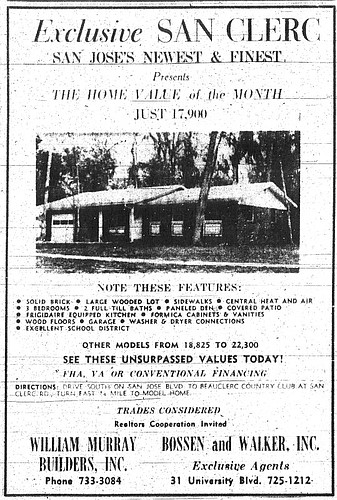
The Jacksonville Area Chamber of Commerce won the Florida Development Commission’s industrial development award for cities with more than 100,000 residents.
The presentation was made in Tallahassee at the governor’s chamber of commerce merit awards program and luncheon sponsored by the commission.
Harold Colee of Jacksonville, executive vice president of the Florida Chamber of Commerce, was presented a special award by Gov. Haydon Burns in recognition of his many years of service to the state.
The Jacksonville chamber also received the community development plaque in 1961 and 1962 and a combined community and industrial development award in 1963.
The awards were suspended in 1964-65.
Burns predicted the number of tourists visiting Florida each year would “boom from 16 million to 23 million or even 25 million almost overnight” when the Walt Disney and Roy Rogers attractions in Central Florida and the visitor’s center at Cape Kennedy were in full operation.
He also predicted the state would continue its trend toward becoming a year-round vacation destination.
• A two-day symposium on urban development, described as the first major political seminar of its type at Jacksonville University, opened with an all-university convocation in Swisher Gymnasium.
The conference on “The Politics of Urban Development” was led by Scott Greer, director of the Center for Metropolitan Studies at Northwestern University in Evanston, Ill.
Henry Maier, mayor of Milwaukee, said at the conference that municipal decision makers were in dire need of reliable data that could be gathered easily by an institution such as JU.
“We live in a world where it now takes less time to fly around the world and more time to drive to work,” Meier said. “It is more difficult to run a city than to put a man on the moon.”
The conference was financed by a grant from the S&H Foundation, sponsored by Sperry and Hutchinson Co., which was well-known for its “green stamps” given to customers at grocery stores.
JU was one of 38 colleges and universities selected from 398 applicants to receive S&H grants.
Each institution submitted proposed lecture topics.
The proposals the judges deemed most worthy, timely and significant were selected for financing.
• Also at Jacksonville University, the Hillgreen Lane pipe organ was dedicated in the recital hall in the Phillips Music and Fine Arts Building.
Frances Kinne, dean of the College of Music and Fine Arts, recognized those who worked toward what she called the “crowning feat” of furnishing the building.
JU President Robert Spiro accepted the pipe organ, on which the dedicatory recital was played by Sam Batt Owens, associate professor of music, director of the male chorus and college organist at Birmingham Southern College.
• A dapper gunman almost too courteous to be taken seriously held up the Food Fair store in Philips Highway Plaza about 10 minutes after it closed for the night.
He escorted the head cashier to his car as a hostage, thanking an unsuspecting bag boy who opened the door for him.
The eight employees and two customers in the store at the time said the armed robber looked as though he had stepped from a fashion magazine.
One said he could see his face reflected in the man’s shoeshine.
The amount of money was said to be substantial, but no estimate of loss was given.
Detective Sgt. F.K. Petty said store manager William Maxwell was putting the day’s receipts into the safe about 9:10 p.m. when the man approached him.
Maxwell said he was told to “get a bag and fill it,” but thought the man was joking and refused.
The gunman repeated his request twice more and Maxwell refused twice more.
That’s when the robber put a pistol to the back of cashier Ella Mae Dixon’s head and cocked the trigger.
Maxwell filled a bag Dixon handed him and gave it to the gunman, who then took Dixon to his car.
She told police he said, “I hope I didn’t frighten you.”
• In Washington, D.C., an assistant commissioner of education promised an African-American group from Jacksonville the government would investigate conditions in Duval County schools.
The seven-member group conferred with David Seeley, the assistant commissioner, and staff aides. They protested what they called “the Duval County hard-core system of segregation and other inequities” in the public schools.
Wendell Holmes Jr., spokesman for the group, said they told Seeley while 22 percent of African-Americans in Dade County attended desegregated schools and 19 percent in Pinellas County, less than 1 percent of Duval County’s African-American children attended integrated schools.
After the meeting, Holmes said, they were given “a firm commitment for an investigation.”
The group asked that federal aid to schools be cut off if the inequities were not resolved.
Friday, the day after the Jacksonville delegation returned from Washington, five civil rights and ministerial groups called for a two-day boycott by parents, both black and white, in Duval County.
School Superintendent Ish Brant asked the parents and the students not to take part in the demonstration.
“I appeal to students and parents alike to make every effort to be in school Monday morning and every day thereafter,” he said. “Every day pupils are out of school, they are falling behind in our efforts to give them an equal education.”
Holmes said 10,000 leaflets explain the groups’ grievances were being distributed throughout the county.
He also said ministers would explain the requested protest from their pulpits on Sunday morning.